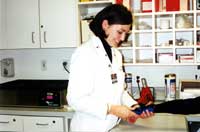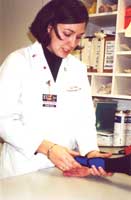|

Occupational
Therapy
By
Sybil Maimin
“I
have so much fun and satisfaction on my job that sometimes, at
the end of the day, I can’t believe I’m being paid to do it.”
This enthusiastic affirmation of her career choice comes from
Trish Pelc, OTR (Occupational Therapist Registered), a vivacious
young woman born and trained in Canada, who now works at the Hand
Therapy Service of the Hospital for Special Surgery in New York
City. She discovered the field of occupational therapy (OT) while
in high school when she worked as a volunteer at a multi-care
nursing home. At the University of Toronto, where she received
a BS after completing the four-year OT program, she was drawn
to the specialty of hand therapy when she realized, during a hospital
internship, that it involves a high degree of creativity and improvisation.
She always loved arts, crafts, and making things and recognized
a natural fit with the specialty. She honed her skills during
a six-month fellowship at the Philadelphia Hand Center. The OT
field is very broad, however, and many concentrations are possible,
including: neurological, mental and physical disabilities, ergonomics,
pediatric and developmental problems, rheumatology and research.
Occupational therapists “get people back to activities of daily
living.” This involves looking at a problem that limits functioning
and figuring out how to reacquire needed skills. For example,
a patient with an injured hand might be unable to pull a zipper
or use a pen, functions necessary in his or her life. The OT will
break down the activity and rebuild and strengthen necessary muscles,
little by little. She may fabricate a splint or mold a cast using
moist heat and thermoplastic material. Appropriate exercises with
equipment such as objects to squeeze, turn, push, and pull are
employed. It is important that the patient not be limited by a
particular apparatus; techniques and tricks to replicate equipment
at home, where exercises must be continued, are devised by the
therapist. She is “always on a discovery mode,” quipped Pelc,
relishing the creative side of her job. She must come up with
and teach strategies for doing particular tasks and give psychological
support. She must educate her patients about what happened to
them, their current condition, and what to expect. Her greatest
satisfaction and one of the perks of the field is seeing people
get better, generally a realistic expectation.
Therapists can work in hospital settings where advantages include
educational opportunities, interaction with surgeons, broad support
staff, and research options. Private or group practice are alternatives
which can be more lucrative (hospital therapists can expect about
$40,000 to start with advanced salaries in the high $60’s). Training
in the United States usually involves a 2-year master’s program.
Before practicing, therapists must pass an exam given by the National
Board for Certification in Occupational Therapy and obtain a license
from the state in which they plan to work. The field is growing
dramatically and the job market is excellent. More information
can be obtained from the American Occupational Therapy Association
(www.aota.org).#

Education Update, Inc., P.O. Box 20005, New York, NY 10001. Tel:
(212) 481-5519. Fax: (212) 481-3919. Email: ednews1@aol.com.
All material is copyrighted and may not be printed without express consent of
the publisher. © 2001.
|

